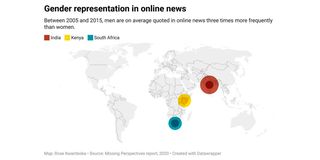Women in News urges media to diversify content

A map on gender representation in online news.
What you need to know:
- WiN is a programme under WAN-IFRA, a global trade organisation for the news-publishing industry.
- The association represents nearly 60 national publishers’ associations from around the world, including more than 15,000 newspapers and 18,000 news websites.
Women in News (WiN) has asked media managers to diversify their content to reflect the demographic and economic representation of communities.
Speaking during virtual training of media managers in Africa in gender balance in content, WiN’s advisory lead trainer Vincent Kahiya said that diversity and inclusion play a key role in building trust with audiences.
“Creating gender equality at enterprise level is more than fulfilling a quota or being politically correct, it is actually good business,” he said.
Mr Kahiya added that gender balance can improve successful conversions and increase audience engagement, particularly among women. He also urged the managers to implement strategies that tap into the young audience.
Farah Wael, WiN’s Research and Digital manager, said media managers must proactively work to overcome their inherent biases. She encouraged managers to utilise their free-to-use gender-tracking application, which allows journalists and media houses to check the level of gender balance in their content.
“Tracking content assesses the scale of imbalance and provides a benchmark to measure the progress or decline,” stated Ms Wael.
The Tracker checks the prominence of women-in-news stories, the inclusion of women voices and their perspectives to assess gender balance in reports. It also scans the proportion of women main characters who appear in an article. In addition, the tracker monitors direct and indirect quotes by women sources, as well as the number of stories written by women journalists.
WiN advisory manager Susan Makore asked managers to take a public stand for equity. Further, she urged them to assess their human resource practices to measure what works well in current economies.
“Modern HR practices that include family-friendly policies, flexible working terms and remote teleworking increase efficiency, decrease absenteeism and stimulate overall growth of organisations,” she said.
Incentives, she added, is one strategy that could inspire and sustain progress in gender balance.
WiN is a programme under WAN-IFRA, a global trade organisation for the news-publishing industry. The association represents nearly 60 national publishers’ associations from around the world, including more than 15,000 newspapers and 18,000 news websites.





